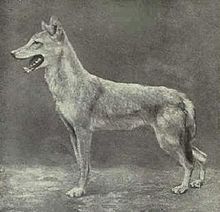
February 9, 2011

News from Egypt.
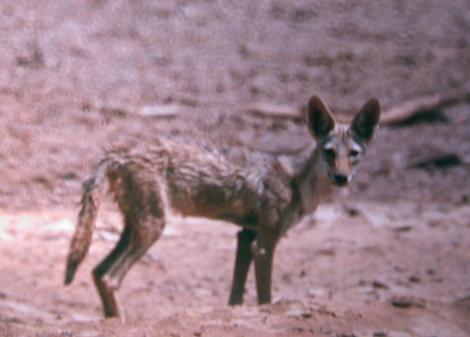
Here’s one we had to delay mentioning due to our travel schedule: Late in January, it was announced that scientists studying genetic evidence have discovered a new species of wolf living in Africa.
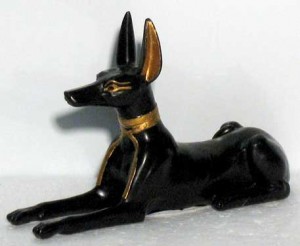
The researchers have proved that the mysterious animal, known as the Egyptian jackal and often confused with the golden jackal, is not a subspecies of jackal but a gray wolf.
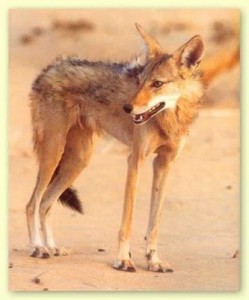
Golden Jackal.
The discovery, by a team from Oxford University’s Wildlife Conservation Research Unit (WildCRU), the University of Oslo, and Addis Ababa University, shows that gray wolves reached Africa around 3 million years ago before spreading throughout the northern hemisphere. The new wolf is a relative of the Holarctic grey wolf, the Indian wolf and the Himalayan wolf.
A report of the research appears this week in the journal PLoS One.
Professor David Macdonald, an author of the paper and Director of Oxford University’s WildCRU, said: “A wolf in Africa is not only important conservation news, but raises fascinating biological questions about how the new African wolf evolved and lived alongside not only the real golden jackals but also the vanishingly rare Ethiopian wolf, which is a very different species with which the new discovery should not be confused.”
Professor Claudio Sillero, also of the WildCRU and Chair of the IUCN’s Canid Specialist Group, who has worked in Ethiopia for more than two decades, said: “This discovery contributes to our understanding of the biogeography of Afroalpine fauna, an assemblage of species with African and Eurasian ancestry which evolved in the relative isolation of the highlands of the Horn of Africa. Rare Ethiopian wolves are themselves a recent immigrant to Africa, and split off from the grey wolf complex even earlier than the newly discovered African wolf.”
Dr Eli Rueness of the University of Oslo, the first author of the paper, said: “We could hardly believe our own eyes when we found wolf DNA that did not match anything in GenBank.”
Professor Nils Chr. Stenseth, an author of the paper and the Chair of the Centre for Ecological and Evolutionary Synthesis (CEES) said, “this study shows the strengths of modern genetic techniques: old puzzles may be solved.”
The team also found genetically very similar specimens to this new wolf in the highlands of Ethiopia, 2,500 km from Egypt, suggesting that the new species is not just found in Egypt.
Professor Afework Bekele at Addis Ababa University added: “This shows how genetic techniques may expose hidden biodiversity in a relatively unexplored country like Ethiopia.”
Golden jackals are regarded by the International Union for Conservation of Nature as not threatened – a “species of least concern” – but the newly discovered African wolf may be much rarer. The team believe it is a priority for both conservation and science to discover its whereabouts and numbers.
Professor Sillero said: “It seems as if the Egyptian jackal is urgently set for a name-change, and its unique status as the only member of the grey wolf complex in Africa suggests that it should be re-named ‘the African wolf’.”
WildCRU is part of Oxford University’s Department of Zoology.
A report of the research, “The cryptic African wolf: Canis aureus lupaster is not a golden jackal and is not endemic to Egypt,” is published late in January 2011, in PLoS One.
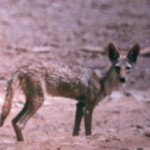
About Loren Coleman
Loren Coleman is one of the world’s leading cryptozoologists, some say “the” leading living cryptozoologist. Certainly, he is acknowledged as the current living American researcher and writer who has most popularized cryptozoology in the late 20th and early 21st centuries.
Starting his fieldwork and investigations in 1960, after traveling and trekking extensively in pursuit of cryptozoological mysteries, Coleman began writing to share his experiences in 1969. An honorary member of Ivan T. Sanderson’s Society for the Investigation of the Unexplained in the 1970s, Coleman has been bestowed with similar honorary memberships of the North Idaho College Cryptozoology Club in 1983, and in subsequent years, that of the British Columbia Scientific Cryptozoology Club, CryptoSafari International, and other international organizations. He was also a Life Member and Benefactor of the International Society of Cryptozoology (now-defunct).
Loren Coleman’s daily blog, as a member of the Cryptomundo Team, served as an ongoing avenue of communication for the ever-growing body of cryptozoo news from 2005 through 2013. He returned as an infrequent contributor beginning Halloween week of 2015.
Coleman is the founder in 2003, and current director of the International Cryptozoology Museum in Portland, Maine.
Filed under Breaking News, Cryptid Canids, CryptoZoo News, New Species